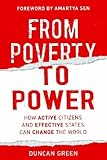“When I was a boy of fourteen,” Mark Twain once said, “my father was so ignorant I could hardly stand to have the old man around. But when I got to be twenty-one, I was astonished by how much he'd learned in seven years.”
My relationship with the book From Poverty to Power by Duncan Green of Oxfam is a bit like that between Mark Twain and his father. Despite all the critical things said about neoclassical economics, the World Bank and the Washington consensus in the book, I find myself agreeing fully with the conclusions of the book.
 Sent from BlueOrganizer
Sent from BlueOrganizer
According to Duncan, to reduce poverty, you need both active citizens and an effective state. This is the same conclusion we reached in the 2004 World Development Report, Making Services Work for Poor People. The reason why you need both is that the state by itself often fails to represent the interests of its poor citizens. Even in democracies such as India or contemporary South Africa, we find public education and health services failing to reach the poor. Yet politicians get elected and re-elected. It is because of these “political market failures” that we need active citizens who will advocate for the poor, mobilize them, and ensure that politicians will be accountable to them.
Given that Duncan’s book is predicated on the existence of these “government failures,” I wonder why he chooses to reiterate some of Oxfam’s standard policy positions, many of which don’t hold water in the presence of government failures. I will mention two.
- The book extols the virtues of eliminating user fees in education. Demand curves slope downward, so lowering the price will increase demand. The question is whether supply will respond accordingly. In the same country as the book cites, Uganda, a Public Expenditure Tracking Study showed that in 1996 only 13 percent of the public money intended for public schools actually reached the schools. The absentee rate of teachers in Ugandan public schools is 27 percent. With all these government failures, it is hard to see how eliminating user fees will by itself improve the quality of education of Uganda’s poor. In fact, paying user fees is one of the few ways that poor people can hold teachers and school administrators accountable.
- The book advocates for increasing public spending on health. The problem is that there is very little evidence that increasing public health budgets actually leads to improved health outcomes, such as reduced child mortality. And the reasons are fairly clear. In India, some 33 percent of the public health budget goes to the richest quintile of the population; only 10 percent goes to the poorest 20 percent. The absentee rate for doctors in public health clinics is 40 percent. And unqualified private doctors in poor neighborhoods of Delhi give better service than qualified public doctors . In this situation, do you really want to increase public health spending?
In sum, while I agree with the conclusion of the book, I find these conclusions at odds with some of the policy positions of Oxfam, many of which are reprised in the book. I said earlier that my relationship with this book is a bit like Mark Twain’s with his father. It’s just that I’m not sure which one of us is Mark Twain, and which one is the father.


Join the Conversation